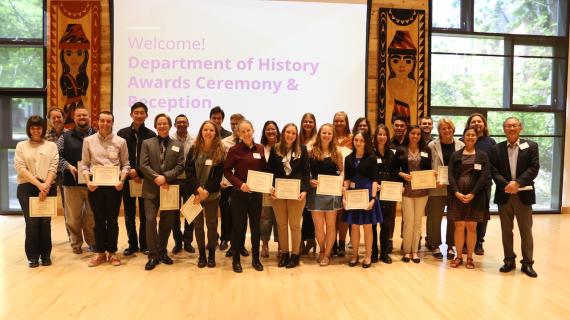Every Spring the Department of History gets to come together in celebration of some its brightest members at the History Awards Ceremony.
This year, almost $200,000 was awarded in the form of departmental scholarships and prizes to undergraduate and graduate students in recognition of their excellent work and service. These awards represent the breadth and depth of activity in the Department of History community - from recognizing outstanding and thought-provoking research papers, to excellence in student leadership and teaching.
In total, 36 undergraduate, and 4 graduate students were recognized for 49 different awards, many of which are made possible with the help of generous donors.
See below for the full list of recipients:
The Pressley Prize for Excellence in Secondary Education.
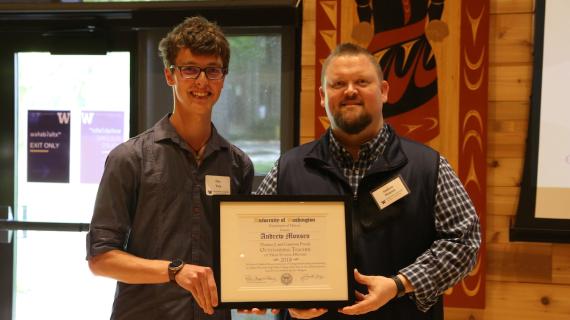
A highlight of the ceremony is always The Pressley Prize for Excellence in Secondary Education, which is awarded each year to an outstanding high school teacher in the state of Washington. This award recognizes all the great work teachers at this level put in to inspire the next generation of UW history majors. Each year the Department of History solicits nominations from undergraduate and graduate students, who submit short essays describing the talents of their favorite high school history teacher. The Director of Undergraduate Studies then interviews principals at the schools where finalists for the prize teach.
This year’s recipient was Mr. Andrew Monsen who teaches US History, Civics, Human Geography and Sociology at Auburn Riverside High School . The award giving was made extra special by the fact that Mr. Monsen was introduced by his former pupil, and current UW student, Dax Tate, who had nominated him for this prize.
Tate described Mr. Monsen as a caring and inspiring teacher who encouraged students to think critically, carefully, and with an open mind, about the past, and in the present. One example of this is the question Mr. Monsen poses at the start of his US History course – he asks, Where is your constitution now?
Through this device, students are challenged to personally engage with the historical foundations of the US and to reflect on how these ideals have continued to shape and impact society over time. Mr. Tate also recalled times when Mr. Monsen went above and beyond, acting as a mentor to himself and many others as well as a teacher. He talked about how he would often seek his sage advice especially when he found himself unable to communicate with those who held opposing points of view. He credits his history teacher with helping him to develop strong communication and reasoning skills.
Mr. Monsen’s commitment to his students was seconded by David Halford, principle at Auburn Riverside High School. Mr. Halford also commented on his innovative and impactful teaching style -
"His classes focus on living documents, perpetuating ideals and civic participation’" which reflects “his commitment to civic responsibility and democratic values. He is a much deserving recipient of this award and we are fortunate to have him.”
Undergraduate Awards:
Bicknell Fund for Academic Travel
Established by Professor Emeritus Daniel C. Waugh, this fund provides travel aid for students who intend to study the languages and cultures of Russia, Eastern Europe, Central Asia, the Near and Middle East, and North Africa.
This year there were two recipients, Jacqueline Goodrich for her upcoming study at Humboldt University in Berlin, Germany, and Victoria Jackson for her study in Iceland.
Denison-Kernaghan Endowed Scholarship
This award celebrates a friendship of more than 20 years between Mark Kernaghan and Virginia Brandeberry Denison. It is the donor's hope that this endowment fund will be an enduring legacy to help students gain rich experiences through their education.
This year’s recipient is Ilan Nurick.
Meder-Montgomery Family Endowed Student Support Fund in History
This award was established by Marilyn Montgomery, an alumnus of the UW Department of History, to be used to support undergraduate history majors and their studies.
This year three students were chosen for this award - Inhyuk Cho, Jacob Harner and Logan Marek
Otis Pease Scholarship
The Otis Pease Scholarship is named after longtime UW History professor Otis Pease. It supports the activities of undergraduate history majors with an interest in US history.
This year’s recipient is Michael Talen
E.J. Roberts Scholarship
This scholarship is intended to engage history majors in research opportunities.
Michael Talen also received this award.
Faye Wilson Award
The Faye Wilson scholarship is made possible through the generosity of Faye Wilson, who directed that a portion of her estate be used by the University of Washington Department of History to assist outstanding undergraduates with tuition costs. It is awarded based on academic excellence, among other criteria.
2017/18’s recipients were Jacqueline Goodrich, Victoria Jackson, Reidar Kelstrup, Isabelle Matlick, Rogelio Mendoza, Meghan Weekley, Meredith Weinstock and Jasper Winters.
Schwartz Award
The Schwartz scholarship is made possible through the generosity of Maurice and Lois Schwartz, who endowed a scholarship fund in 1977 to support the study of non-western history at the University of Washington. It is awarded based on academic excellence and commitment to the study of non-western history.
This year’s recipients were Cleone Abrams, Rachel Jecker, Ilan Nurick and Emma Peterson.
Corkery Scholarship
The Corkery Scholarship is made possible through the generosity of donors who wished to support undergraduate history majors with an interest in ancient history.
This year recipients were Sarah Barsion and Alexander van de Poel.
Sleizer Award
The Sleizer scholarship was made possible by the generosity of Herman and Rose Sleizer, who endowed a fund in 1989 in honor of their late son, Larry Lee Sleizer. It is awarded for academic excellence and commitment to the study of history.
This year’s winners were Alexander Clark, Charles Cofflan, Nicole Engelhardt, Zhiqin Gao, Jonathan Gillam, Alexander Guettler, Sarit Laschinsky, Madison Oversby, Calvin Paulson, Jonathan Pry, Xavaar Quaranto, Meghan Weekley, Meredith Weinstock, Peter Welch, Katherine Wooley and Allison Vaughn.
Ravage Endowment Prize
The Ravage Endowment Prize is for an outstanding paper or project written on the history of African American’s with a preference for African Americans in the American West. This award is made possible by the generosity of Jack and Linda Ravage.
This year’s winner was Gabriela Avila for her paper - “Blackness on the Big Screen: African Americans’ Influence on Hollywood Film.”
Gabriela’s paper presents an impressive overview of black actors’ experience in the 20th century film industry. She argues how those playing early, stereotypically submissive roles - from the silent “Uncle Tom’s Cabin,” to “Gone with the Wind” - were criticized by progressive commentators but defended their performances both in economic terms and as opening doors for later, better roles. She concludes with an analysis of two recently acclaimed films by black directors, the unforgettable, Academy Award winning “Get Out” and this year’s “Black Panther,” the first Hollywood film with all black actors.
Power Prize
This award, named in memory of a former history major at the University of Washington, is given to undergraduates who have produced truly outstanding research papers in a University of Washington History course.
First prize went to Jesse Du for his paper “In the Crossfire of Memories and Identities: The East Asian Controversy over Hiroshima and Nagasaki.”
Honorable mentions went to Annie Lewis for her work - “Precarious Whiteness: Reimagining the Seattle Sephardic Origin Story,” and Hannah Gearhardt for her paper - “Traversing Gender: Non-Normative Gender in the United States, 1900-1930.
Freedman Remak Award
This scholarship, named for Nancy Freedman and Ben Remak, both of whom were at the ceremony, was created to support history majors who face the high costs of non-resident tuition. Nancy Freedman herself had been an out-of-state student at the University and knows first-hand the financial burden such students face. At a time when non-resident tuition runs in excess of $35,000, I think it is safe to say this fund is more valuable than ever. The scholarship is awarded on the basis of non‐resident status and academic excellence.
This year’s recipient was Paula Araque.
Award to Honor Dick Kirkendall on his 90th Birthday
This is an honor given a to a student with outstanding scholarship in the field of American history, particularly in US Presidential history.
This year’s award went to Peter Welch.
Power Prize for Outstanding Graduating Senior
This award is named in memory of the same former history major at the University of Washington, and it recognizes the outstanding work of undergraduates who are completing the major in the Department and graduating this year.
This year the department awarded Tamara Major.
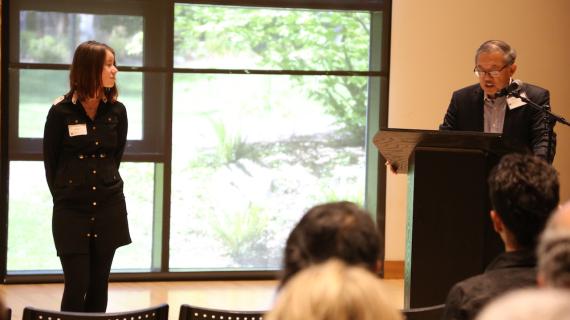
Tamara is an extraordinary student. With a 3.95 UW GPA, and a 3.93 History GPA, she has excelled in her coursework and thrived as a History major from the moment she entered UW as a transfer student. Her first quarter instructor Joel Walker stated, “Tamara distinguished herself by her intellectual intensity and curiosity already as a first quarter transfer student in my Ancient World course.” Further Mira Green, another history professor, shared that she noticed that primarily male students were responding to questions in class lectures. “The one exception to this was Tamara. Every class period this quarter, Tamara commented again and again in class, raising interesting points and asking thoughtful questions…Additionally, she often would build on her peers’ remarks, but was not afraid to disagree with them as well. By the end of the quarter, more and more female students began engaging in lecture, and I attribute this to Tamara’s constant, confident voice in class.” As another history professor, John Findlay stated, “she was a top-rank student in two of my courses – fearless about speaking up and possibly being wrong, always terrific about responding to criticism, and very generous toward her fellow discussants in class. “Outside the UW classroom, Tamara took the opportunity to study abroad with History’s departmental exchange at Cardiff University where she was able to immerse herself in the culture and history of Wales. Also, while here at UW she spent a great deal of time volunteering in public high schools. Tamara’s combination of reflection, confidence and fostering conversation, as well as her ability to explore historical source materials should serve her very well in her chosen field of secondary education. She was recently accepted to Teach for America in the South Puget Sound area.
ower Prize for Outstanding Student Leader
Given to a graduating History major, this award recognizes the recipients outstanding work to integrate the study of history with community and public engagement. As such, it builds on the department's sense that many of our students are drawing on their studies to do important work beyond the classroom.
This year’s well deserving winner was Hannah Takemori.
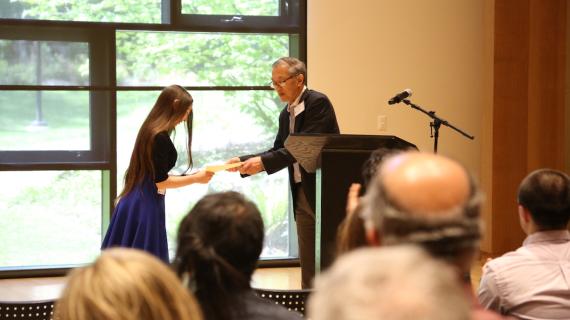
Hannah majored in History and will graduate from the University of Washington this spring. Perhaps more importantly, however, Hannah has distinguished herself as a lead advocate for the study of history at the University of Washington and in her research on multiracial Japanese Americans. Her Honors in History thesis, “’It Must be Odd to be a Minority’: Multiracial Japanese Americans, Racial Segregation, and the U.S. Empire” which was last year’s Power Paper Prize winner, helped Hannah lay the groundwork in delving into these histories. She has worked to document, preserve, and interpret the history of multiracial Japanese Americans during and after World War II. This body of work focused first and foremost on its relevance to Japanese American communities today. Hannah’s talents and accomplishments have also been recognized by the university as she was recently selected as one of the 2018 Husky 100, an honor for students “who are making the most of their time at the UW.” In her nomination for the Husky 100, History advisor Nell Gross described Hannah as “kind, considerate and dedicated, not to mention an exemplary historian! Hannah approaches her school work, extracurricular projects and community service from a perspective of inclusion, concerning herself primarily with those individuals or historical concepts that are otherwise left out of the conversation.”
Beyond this, she is a wonderful and friendly presence in the Department’s main office, offering help to anyone who should enter. Hannah was also recognized for her tremendous support of the Department of History and particularly our faculty. She recently tracked down current students, and even alumni, and encouraged them to support Dr. Joel Walker for the UW Honors Teaching Award. She put a great deal of effort into making sure Dr. Walker was recognized for his excellent teaching; we are very happy to say that she was successful in this endeavor! We are inspired by Hannah’s consistent commitment to uncovering the history of Japanese Americans, her deep love of history, and her support of those in the department, and we are proud to award her this prize.
Graduate Awards:
Power Prize for Outstanding Student leader.
This year’s recipient was Josue Estrada. Josue has been actively involved in the University of Washington where he has worked with the Harry Lloyd Bridges Labor Center, with Admissions Office and has actively engaged in many ways in the Department of History. Additionally, Josue has been publicly engaged as a Mangels Fellow for Public History where he crafted a project with materials from UW’s Special Collections Archive to launch an outreach program, in conjunction with UW Promise, for high schools in Washington State with high numbers of minority and underrepresented students to boost their interest in applying to UW and in history classes. For this project, Josue visited high schools and community colleges in Eastern Washington, where he himself grew up, as well as worked with these students as they visited UW’s campus. He shared materials from the archives – demonstrating that history is accessible and students may use these materials – and helped students become curious about their own histories and the world more largely as well as the potential for furthering their education, specifically at UW.
Josue has also been a member of our Department of History Diversity Committee where he aids in making the department a place more accessible to all students, staff and faculty. As part of this work, this fall he also served as a panelist for our annual “Why Race Matters: Resistance & Resilience.” He was the only graduate student panelist amongst several faculty from Anthropology, History and American Ethnic Studies. Last year, Josue participated in the Labor and Working Class History Association Conference, held here at UW. Josue presented his study of Latino voter suppression in Yakima and its dilution of the power of the Latino vote. Josue’s research into the history of Latinos’ winning and defending of voters’ rights and the reform of the local electoral system demonstrated the impact that such research could have on public policy. For this work he was recently featured on UW.
Graduate Power Paper Prize
This year’s Winner of the Graduate Power Paper Prize was Taylor Soja.
In “Miss Macnaughtan’s Wars: South Africa, World War I, and British Women’s War Writing,” Taylor Soja tells the story of Sarah Broom Macnaughtan, a successful Scottish novelist who toiled to be taken seriously as a woman observer of war. Between 1890 and 1916, Macnaughtan traveled to South America, the Balkans, South Africa, and then the Western Front. She aimed not only to write in an influential way about these conflicts but also to find ways for women not trained as nurses to be of service to British combatants and the nation. Soja skillfully evokes Sarah Macnaughtan’s complex brand of feminism and situates it within the context of the broader society’s debates about women’s capabilities as well as the meanings of warfare. The essay is beautifully written and thoroughly researched.
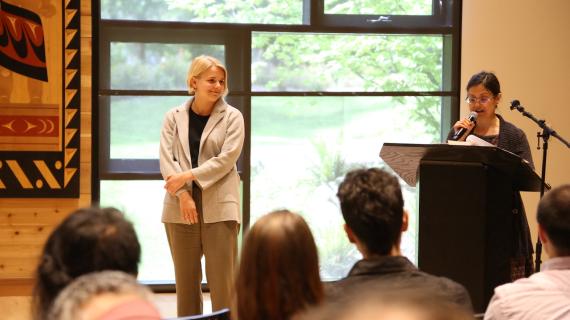
Ravage Endowment Paper Prize
The Ravage Endowment Prize is awarded for an outstanding paper or project written on the history of African American’s with a preference for African Americans in the American West. This award is made possible by Jack and Linda Ravage. This year’s Ravage Recipient was Andrew Hedden.
Andrew’s paper, “Food Stamp Capital: The Politics of Welfare in Seattle’s Economic Crisis, 1969-1972 is a thoroughly researched and deftly written chapter on the rise of the new urban liberalism during Seattle’s Boeing Bust. The essay revolves around the efforts of Bernadine Garrett, who graduated from the role of organizer for the National Welfare Rights Organization to become the first African American woman to run for the Seattle City Council. Garrett’s campaign called for more assistance for the hungry, the poor, and the unemployed. Hedden brilliantly inventories competing perspectives on the American welfare state by juxtaposing Garrett’s views and tactics to those of the union leaders of the thousands of workers laid off by Boeing and to those of the city’s mainstream media and politicians who often spoke and acted in ways that minimized the very crisis that Garrett was trying to address.
Power Prize for Outstanding Teaching Assistant in the Department of History
This year’s winner was Taylor Soja. Taylor received three nominations for her work as a teaching assistant this year, all faculty attested to her skill in the classroom. Laurie Marhoefer, one of Taylor’s nominees stated, “the best adjective I can think of to describe Taylor’s work is ‘outstanding.’ Every aspect of how she did her job was highly effective. As one student evaluation stated, “Taylor made me feel like she wanted me to succeed and was very helpful to me!” Many other students expressed that she was “the best” and that they emailed her 10 or more times and received prompt and very clear responses. Mary O’Neil, who also nominated Ms. Soja described her as “my best TA in quite a while, reminding me of a certain golden age of TAs. I felt that her ability to deal with the chronological framework of this course (ancient world to 17th century) was especially notable in that she is basically a 20th century graduate student.”
Robin Stacey, a third professor who nominated Taylor for outstanding TA described a challenging situation with a student and the way in which Taylor spoke to the student, “it was clear from that conversation that she is an experienced and compassionate TA with a strong dedication to her students and is fully deserving of this award!”
Burke Prize
The Burke Prize is an award named after former Pacific Northwest historian and University of Washington Department of History faculty member, Robert Burke. The prize is given to the graduate student deemed to have amassed the most meritorious record during the year he or she completes the MA in US history. This year’s recipient Jennifer Smith.
Jennifer completed her MA in American history under the supervision of Josh Reid and Linda Nash, combining her interests in American Indian history and US environmental history. Her Masters seminar paper, “Companions to Commodities: Horses, Survival, and Resistance on the Colville Indian Reservation, 1872-1925,” was an examination of the continuity of horse culture among the Indians of the Colville reservation. Jennifer’s paper examined the ways that settler encroachment and resource scarcity threatened the Indians’ traditional relationship with horses, and how the Indians found ways to make a transition from engaging with horses as companions to horses as commodities by the early twentieth century. Horses then became a means of financial support for the Indians, as well as a means to resist pressure to assimilate.
Another great year for the Department of History. Congratulations again to all the recipients!
